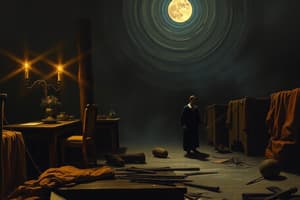Podcast
Questions and Answers
What literary device is used in the phrase 'They pointed their fingers, the way one might choose cattle, or merchandise.'?
What literary device is used in the phrase 'They pointed their fingers, the way one might choose cattle, or merchandise.'?
What does the metaphor 'They pointed their fingers, the way one might choose cattle, or merchandise.' suggest about the prisoners?
What does the metaphor 'They pointed their fingers, the way one might choose cattle, or merchandise.' suggest about the prisoners?
They began to see each other as animals.
In the phrase 'The dentist, a Jew from Czechoslovakia, had a face not unlike a death mask.', which literary devices are identified?
In the phrase 'The dentist, a Jew from Czechoslovakia, had a face not unlike a death mask.', which literary devices are identified?
What is the symbolism in the statement 'In fact, I was pleased with what was happening to him, I felt no pity for him: my gold crown was safe.'?
What is the symbolism in the statement 'In fact, I was pleased with what was happening to him, I felt no pity for him: my gold crown was safe.'?
Signup and view all the answers
The statement 'The bread, the soup -- those were my entire life.' is an example of what literary device?
The statement 'The bread, the soup -- those were my entire life.' is an example of what literary device?
Signup and view all the answers
What literary device is used in 'I was nothing but a body. Perhaps even less: a famished stomach.'?
What literary device is used in 'I was nothing but a body. Perhaps even less: a famished stomach.'?
Signup and view all the answers
What literary device is illustrated in 'Bite your lips, little brother...Don't cry. Keep your anger, your hate, for another day, for later.'?
What literary device is illustrated in 'Bite your lips, little brother...Don't cry. Keep your anger, your hate, for another day, for later.'?
Signup and view all the answers
In the sentence 'Hundreds of eyes were looking at him, shining with desire.', what literary device is primarily used?
In the sentence 'Hundreds of eyes were looking at him, shining with desire.', what literary device is primarily used?
Signup and view all the answers
What literary device is represented in 'We were not afraid. And yet, if a bomb had fallen on the blocks, it would have claimed hundreds of inmates' lives.'?
What literary device is represented in 'We were not afraid. And yet, if a bomb had fallen on the blocks, it would have claimed hundreds of inmates' lives.'?
Signup and view all the answers
What is the significance of the statement 'These withered bodies had long forgotten the bitter taste of tears.'?
What is the significance of the statement 'These withered bodies had long forgotten the bitter taste of tears.'?
Signup and view all the answers
What does the metaphor 'That night, the soup tasted of corpses.' imply?
What does the metaphor 'That night, the soup tasted of corpses.' imply?
Signup and view all the answers
Study Notes
Metaphors and Comparisons
- Comparison of Selection: The act of pointing fingers compares the selection of prisoners to choosing livestock or merchandise, illustrating dehumanization.
- Dentist’s Appearance: The dentist is likened to a death mask, highlighting the severity of his malnutrition and the grim reality of the camp.
- Jealousy as a Consuming Force: Describes jealousy as something that devours individuals, showing its destructive nature.
Symbolism
- Gold Crown: Represents survival and the desperate attempts to barter for life; its significance foreshadows its eventual loss.
- Pipel's Face: Symbolizes hope amid despair, conveying the fragility within the harsh environment of the concentration camp.
Irony
- Elie's Reaction to the Dentist: The situational irony lies in Elie's lack of pity for the dentist, highlighting moral deterioration amid survival instincts.
- Joy in Danger: Inmates find unexpected joy in bombings, indicating a loss of fear towards death and a peculiar form of hope in chaos.
- Kapo's Refusal: The Kapo's sudden hesitance to execute a young boy reflects situational irony, revealing a conscience previously absent.
Hyperbole and Exaggeration
- Essence of Life: Elie claims that bread and soup are his entire life, emphasizing their importance for survival in the camps, though it's an exaggeration.
- Length of Nod: Elie's nodding is described as endless, conveying the overwhelming nature of his circumstances through hyperbolic expression.
Imagery
- Taste of Corpses: The soup tasting of corpses represents the haunting presence of death, as sensory experiences are deeply affected by trauma and horror witnessed in the camp.
Personification
- Stomach Measuring Time: The empty stomach is personified, illustrating how survival instincts dominate Elie's consciousness amidst the inhumane conditions.
Similes
- Breaking Like a Tree: A person's pain is compared to an old tree struck by lightning, providing a vivid image of physical suffering.
- Mournful Smile: A woman's smile juxtaposes joy with sadness, encapsulating the paradoxes of human emotion during hardship.
Foreshadowing
- Advice to Elie: The encouragement to suppress emotions hints at future struggles while suggesting there is a time for anger and grief, indicating future personal and collective turmoil.
Studying That Suits You
Use AI to generate personalized quizzes and flashcards to suit your learning preferences.
Description
Test your understanding of literary devices in Chapter 4 of 'Night'. This quiz focuses on metaphors and other literary techniques used in the text, helping you deepen your comprehension of the narrative. Analyze how these devices enhance the themes and emotions present in the chapter.




